Belgium in the Eurovision Song Contest
Belgium has participated in the Eurovision Song Contest 64 times since making its debut as one of seven countries at the first contest in 1956. The only countries with the same number or more appearances are Germany (66), France (65) and the United Kingdom (65). Belgium have been absent only three times in total, in 1994, 1997 and 2001, due to low scores in the previous contests that relegated them from the contest. Belgium has won the contest once, in 1986.
| Belgium in the Eurovision Song Contest | |
|---|---|
.svg.png.webp)
| |
| Participating broadcaster | |
| Participation summary | |
| Appearances | 64 (54 finals) |
| First appearance | 1956 |
| Highest placement | 1st: 1986 |
| Host | 1987 |
| External links | |
| Belgium's page at Eurovision.tv | |
Belgium in the Eurovision Song Contest 2023 | |
In the first 20 years of the contest, Belgium's best result was Tonia's fourth place in 1966. In 1978, Jean Vallée achieved Belgium's first top three placement, when he was second. Sandra Kim became the first and to date only winner for Belgium in 1986, when she won as a 13-year-old in Bergen, performing the song "J'aime la vie". Belgium's only other top three result came in 2003, when the group Urban Trad finished second in Riga, losing out by only two points. Belgium has finished last in the contest eight times, most recently in 2000, and has twice received nul points, in 1962 and 1965.
After the introduction of the semi-finals in 2004, Belgium failed to reach the final for five consecutive years (2005–09). Since 2010, Belgium has become more successful, qualifying for the final in eight out of 13 contests and placing in the top ten five times, with Tom Dice (sixth in 2010), Loïc Nottet (fourth in 2015), Laura Tesoro (tenth in 2016), Blanche (fourth in 2017), and Gustaph (seventh in 2023).
Broadcasting
Belgium has two national broadcasters of the contest, Dutch-speaking Flemish broadcaster Vlaamse Radio- en Televisieomroep (VRT) and French-speaking Walloon broadcaster Radio-télévision belge de la communauté française (RTBF). The two broadcasters rotate selection for the Eurovision Song Contest each year.
Contest history
Belgium has participated in Eurovision since the very first contest in 1956, however Tonia's fourth place at the 1966 contest remained the country's most notable achievement until Jean Vallée placed second in 1978. In the 80s, following good results for Stella (fourth in 1982) and Jacques Zegers (fifth in 1984), Belgium finished last for the sixth time in 1985. This was followed by Belgium's first and (as of 2023) only Eurovision victory in 1986, when Sandra Kim won with her song "J'aime la vie". Although the lyrics claimed she was 15 years old, she was actually only 13 which prompted runner-up Switzerland to petition for her disqualification, to no avail.[lower-alpha 1] By winning in 1986, Belgium became the last of the seven Eurovision founding countries to win the contest, as Switzerland, the Netherlands, France, Luxembourg, Italy and Germany all had won at least once before. Belgium scored an absolute record at the time, with Kim earning a never-seen-before number of 176 points (that record remained until 1993, with Ireland scoring 187 points). With an average of 9.26 points per voting nation and 77.2% of the maximum possible score, as of 2022, Kim's record still ranks eighth among all Eurovision winners.
Belgium finished last for the seventh time at the 1993 contest, before achieving its only top ten result of the 90s decade at the 1998 contest, where Mélanie Cohl finished sixth. In the 2000s, Belgium experienced mixed fortunes: the country started the decade by finishing last for the eighth and (as of 2022) final time at the 2000 contest in Stockholm, before achieving its best result of the 21st century in 2003 when Urban Trad sang in an imaginary language and earned second place with 165 points, losing out to Turkey's Sertab Erener by just two points. The country then failed to qualify from the semi-finals for 5 consecutive contests from 2005 to 2009.
The 2010 entry for Belgium was Tom Dice, runner-up of the Belgian Flemish version of The X Factor in 2008. Dice finished first in his semi-final, allowing Belgium to participate in the final for the first time since 2004 and eventually finishing sixth overall, Belgium's best result since 2003 and the best result ever for a Flemish entrant (tied with 1959).[1] Belgium then experienced a mix of ups and downs for the remainder of the 2010s: while the country failed to qualify for the final on five occasions (in 2011, 2012, 2014, 2018 and 2019), Belgium qualified in 2013 (with Roberto Bellarosa placing 12th) before scoring a three-year streak in the top ten, thanks to Loïc Nottet (fourth in 2015), Laura Tesoro (tenth in 2016) and Blanche (fourth in 2017). Following two non-qualifications with Sennek (2018) and Eliot (2019), Belgium recorded three consecutive qualifications with Hooverphonic (2021), Jérémie Makiese (2022) and Gustaph (2023), the latter finishing in seventh place overall.
Disparity between broadcasters
Belgium is a federal country divided into two major linguistic regions: Dutch-speaking Flanders in the north and French-speaking Wallonia in the south, each region having its own broadcaster (VRT in Flanders and RTBF in Wallonia). The broadcasters take turns to send the Belgian entry to the contest, and since 2021, Flemish VRT has been in charge on odd years while French-speaking RTBF has been in charge on even years.
There has been a significant difference in the results achieved by the broadcasters.[2] The French-speaking RTBF recorded Belgium's only win in 1986, all of Belgium's ten top-five placements, and 18 out of Belgium's 26 top ten placements. On the other hand, the Flemish VRT has placed in the top ten eight times, while scoring six out of Belgium's eight last-place finishes.[2] In the 1990s, the relegation rule was introduced, where the lowest-placing countries would not be allowed to compete the following year, to accommodate for the growing number of participating countries. Belgium was relegated three times, in 1994, 1997 and 2001; twice following a poor placing by a VRT act the previous year, and once after RTBF act Nathalie Sorce placed last in 2000.[2]
Since the introduction of semi-finals in 2004, the broadcasters have scored similarly in terms of qualification: as of 2023, RTBF and VRT each qualified four times out of nine semi-finals.[3]
Participation overview
| 1 | First place |
| 2 | Second place |
| 3 | Third place |
| ◁ | Last place |
| X | Entry selected but did not compete |
| † | Upcoming event |
Selection process
While VRT normally hosts a national final, Eurosong, when selecting their entries for Eurovision, RTBF usually holds an internal selection process (although it sometimes holds a national final, for example in 1998, 2005[6][7] and 2011, while VRT internally chose Tom Dice for the 2010 edition, Sennek for the 2018 edition and Hooverphonic for the 2020 and 2021 editions).
| Year | Selection process | Broadcaster | Ref. |
|---|---|---|---|
| 1956 | National final with 7 songs | INR | |
| 1957 | Artist: Internal selection Song: National final with 3 songs | NIR | |
| 1958 | National final | INR | |
| 1959 | National final with 2 participants | NIR | |
| 1960 | National final with 5 participants | INR | |
| 1961 | National final with 6 participants | BRT | |
| 1962 | National final with 5 participants | RTB | |
| 1963 | National final with 6 participants | BRT | |
| 1964 | Internal selection | RTB | |
| 1965 | Artist: Internal selection Song: National final with 6 songs | BRT | |
| 1966 | Artist: Internal selection Song: National final with 4 songs | RTB | |
| 1967 | National final with 7 participants | BRT | |
| 1968 | National final with 10 participants | RTB | |
| 1969 | Artist: Internal selection Song: National final with 6 songs | BRT | |
| 1970 | National final with 4 participants | RTB | |
| 1971 | National final with 12 participants | BRT | |
| 1972 | Artist: Internal selection Song: National final with 10 songs | RTB | |
| 1973 | National final with 10 participants | BRT | |
| 1974 | Artist: Internal selection Song: National final with 6 songs | RTB | |
| 1975 | National final with 10 participants | BRT | |
| 1976 | National final with 5 participants | RTB | |
| 1977 | National final with 3 participants | BRT | |
| 1978 | National final with 8 participants | RTBF | |
| 1979 | Artist: Internal selection Song: National final with 3 songs | BRT | |
| 1980 | National final with 7 participants | RTBF | |
| 1981 | National final with 10 participants | BRT | |
| 1982 | National final with 4 participants | RTBF | |
| 1983 | National final with 9 participants | BRT | |
| 1984 | National final with 10 participants | RTBF | |
| 1985 | Internal selection | BRT | |
| 1986 | National final with 9 participants | RTBF | |
| 1987 | National final with 11 participants | BRT | |
| 1988 | National final with 12 participants | RTBF | |
| 1989 | BRT | ||
| 1990 | Internal selection | RTBF | |
| 1991 | Artist: Internal selection Song: National final with 3 songs | BRT | |
| 1992 | National final with 10 participants | RTBF | |
| 1993 | National final with 12 participants | BRTN | |
| 1994 | Did not participate | ||
| 1995 | National final with 10 participants | RTBF | |
| 1996 | National final with 12 participants | BRTN | |
| 1997 | Did not participate | ||
| 1998 | National final with 10 participants | RTBF | |
| 1999 | National final with 8 participants | VRT | |
| 2000 | National final with 10 participants | RTBF | |
| 2001 | Did not participate | ||
| 2002 | National final with 7 participants | VRT | |
| 2003 | Internal selection | RTBF | |
| 2004 | National final with 7 participants | VRT | |
| 2005 | National final with 2 participants | RTBF | |
| 2006 | National final with 7 participants | VRT | |
| 2007 | Internal selection | RTBF | |
| 2008 | National final with 5 participants | VRT | |
| 2009 | Internal selection | RTBF | |
| 2010 | VRT | ||
| 2011 | National final with 14 participants | RTBF | |
| 2012 | Artist: Internal selection Song: National final with 2 songs | VRT | |
| 2013 | Artist: Internal selection Song: National final with 3 songs | RTBF | |
| 2014 | National final with 6 participants | VRT | |
| 2015 | Internal selection | RTBF | |
| 2016 | National final with 5 participants | VRT | |
| 2017 | Internal selection | RTBF | |
| 2018 | VRT | ||
| 2019 | RTBF | ||
| 2020 | VRT | ||
| 2021 | VRT | ||
| 2022 | RTBF | ||
| 2023 | National final with 7 participants and 2 songs for each | VRT | |
| 2024 | Internal selection | RTBF | |
Hostings
| Year | Location | Venue | Presenter |
|---|---|---|---|
| 1987 | Brussels | Centenary Palace | Viktor Lazlo |
Awards
Barbara Dex Award
| Year | Performer | Host city | Ref. |
|---|---|---|---|
| 2000 | Nathalie Sorce |
Related involvement
Conductors
| Year | Conductor[lower-alpha 9] | Notes | Ref. |
|---|---|---|---|
| 1956 | Léo Souris | [13] | |
| 1957 | Host conductor | ||
| 1958 | |||
| 1959 | Francis Bay | ||
| 1960 | Henri Segers | ||
| 1961 | Francis Bay | ||
| 1962 | Henri Segers | ||
| 1963 | Francis Bay | ||
| 1964 | Henri Segers | ||
| 1965 | Gaston Nuyts | ||
| 1966 | Host conductor | ||
| 1967 | Francis Bay | ||
| 1968 | Henri Segers | ||
| 1969 | Francis Bay | ||
| 1970 | Jack Say | [14] | |
| 1971 | Francis Bay | ||
| 1972 | Henri Segers | ||
| 1973 | Francis Bay | ||
| 1974 | |||
| 1975 | Francis Bay | ||
| 1976 | |||
| 1977 | |||
| 1978 | |||
| 1979 | Francis Bay | ||
| 1980 | No conductor | [15] | |
| 1981 | Giuseppe Marchese | ||
| 1982 | Jack Say | ||
| 1983 | Freddy Sunder | ||
| 1984 | Jo Carlier | ||
| 1985 | Host conductor | ||
| 1986 | Jo Carlier | ||
| 1987 | Freddy Sunder | [lower-alpha 10] | |
| 1988 | Daniel Willem | ||
| 1989 | Freddy Sunder | ||
| 1990 | Rony Brack | ||
| 1991 | Roland Verlooven | ||
| 1992 | Frank Fievez | ||
| 1993 | Bert Candries | ||
| 1995 | Alec Mansion | ||
| 1996 | Bob Porter | ||
| 1998 | No conductor |
Commentators and spokespersons
Over the years, commentary for the contest on VRT and RTBF has been provided by several experienced radio and television presenters, including Nand Baert, Jacques Mercier, Luc Appermont and Paule Herreman. From 1991, André Vermeulen provided the Dutch-language commentary every year except 1996. Jean-Pierre Hautier provided French-language commentary from 1994 to 2012, later dying shortly after the 2012 contest. In 1962, BRT retransmitted the commentary feed from the Dutch broadcaster NTS, possibly for financial reasons.
VRT supplied an additional commentator to join André Vermeulen starting in 1998; between 1999 and 2010, dual commentary was provided by either Bart Peeters or Anja Daems. Peeters provided the commentary during the years when VRT selected the entries, whilst Daems commentated the years in which RTBF selected the entries. Sven Pichal replaced Daems in 2011, whilst Peter Van de Veire replaced Peeters. In 2007, Jean-Louis Lahaye joined Jean-Pierre Hautier as a supplementary commentator for RTBF. After Hautier's death in 2012, Lahaye was joined by Maureen Louys in 2013.
| Year | Flemish commentator | French-speaking commentator | Spokesperson | Ref. |
|---|---|---|---|---|
| 1956 | Nand Baert | Janine Lambotte | No spokesperson | |
| 1957 | Nic Bal | Bert Leysen | ||
| 1958 | Arlette Vincent | Paule Herreman | ||
| 1959 | Paule Herreman | Bert Leysen | ||
| 1960 | Georges Désir | Arlette Vincent | ||
| 1961 | Commentary via RTF France | Ward Bogaert | ||
| 1962 | Commentary via NTS the Netherlands | Nicole Védrès | Arlette Vincent | |
| 1963 | Herman Verelst, Denise Maes | Pierre Delhasse | Ward Bogaert | |
| 1964 | Herman Verelst | Paule Herreman | André Hagon | |
| 1965 | Ward Bogaert | |||
| 1966 | André Hagon | |||
| 1967 | Ward Bogaert | |||
| 1968 | André Hagon | |||
| 1969 | Jan Theys | Ward Bogaert | ||
| 1970 | André Hagon | |||
| 1971 | Herman Verelst | No spokesperson | ||
| 1972 | ||||
| 1973 | ||||
| 1974 | Georges Désir | André Hagon | ||
| 1975 | Jan Theys | Paule Herreman | Ward Bogaert | |
| 1976 | Luc Appermont | Georges Désir | André Hagon | |
| 1977 | Patrick Duhamel | An Ploegaerts | ||
| 1978 | Claude Delacroix | André Hagon | ||
| 1979 | Paule Herreman | An Ploegaerts | ||
| 1980 | Jacques Mercier | Jacques Olivier | ||
| 1981 | Walter De Meyere | |||
| 1982 | Jacques Olivier | |||
| 1983 | An Ploegaerts | |||
| 1984 | Jacques Olivier | |||
| 1985 | An Ploegaerts | |||
| 1986 | Patrick Duhamel | Jacques Olivier | ||
| 1987 | Claude Delacroix | An Ploegaerts | ||
| 1988 | Pierre Collard-Bovy | Jacques Olivier | ||
| 1989 | Jacques Mercier | An Ploegaerts | ||
| 1990 | Claude Delacroix | Jacques Olivier | ||
| 1991 | André Vermeulen | An Ploegaerts | ||
| 1992 | Jacques Olivier | |||
| 1993 | An Ploegaerts | |||
| 1994 | Jean-Pierre Hautier | Did not participate | ||
| 1995 | Marie-Françoise Renson "Soda" | |||
| 1996 | Michel Follet, Johan Verstreken | Jean-Pierre Hautier, Sandra Kim | An Ploegaerts | |
| 1997 | André Vermeulen | Jean-Pierre Hautier | Did not participate | |
| 1998 | André Vermeulen, Andrea Croonenberghs | Marie-Hélène Vanderborght | ||
| 1999 | André Vermeulen, Bart Peeters | Sabine De Vos | ||
| 2000 | André Vermeulen, Anja Daems | Thomas Van Hamme | ||
| 2001 | Did not participate | |||
| 2002 | André Vermeulen, Bart Peeters | Geena Lisa | ||
| 2003 | André Vermeulen, Anja Daems | Corinne Boulangier | ||
| 2004 | André Vermeulen, Bart Peeters | Martine Prenen | ||
| 2005 | André Vermeulen, Anja Daems | Armelle Gysen | ||
| 2006 | André Vermeulen, Bart Peeters | Yasmine | ||
| 2007 | André Vermeulen, Anja Daems | Jean-Pierre Hautier, Jean-Louis Lahaye | Maureen Louys | |
| 2008 | André Vermeulen, Bart Peeters | Sandrine Van Handenhoven | ||
| 2009 | André Vermeulen, Anja Daems | Maureen Louys | ||
| 2010 | André Vermeulen, Bart Peeters | Katja Retsin | ||
| 2011 | André Vermeulen, Sven Pichal | Maureen Louys | ||
| 2012 | André Vermeulen, Peter Van de Veire | Peter Van de Veire | ||
| 2013 | André Vermeulen, Tom De Cock | Maureen Louys, Jean-Louis Lahaye | Barbara Louys | |
| 2014 | Peter Van de Veire, Eva Daeleman | Angelique Vlieghe | ||
| 2015 | Walid | |||
| 2016 | Peter Van de Veire | Umesh Vangaver | ||
| 2017 | Fanny Gillard | |||
| 2018 | Danira Boukhriss | |||
| 2019 | David Jeanmotte | |||
| 2021 | Fanny Jandrain, Jean-Louis Lahaye | Danira Boukhriss | ||
| 2022 | Maureen Louys, Jean-Louis Lahaye | David Jeanmotte | ||
| 2023 | Bart Cannaerts |
Photo gallery

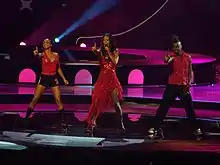


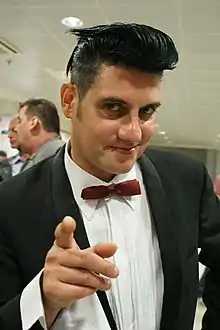
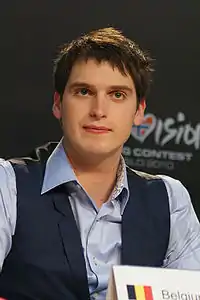
.jpg.webp) Roberto Bellarosa performing "Love Kills" in Malmö (2013)
Roberto Bellarosa performing "Love Kills" in Malmö (2013) Axel Hirsoux performing "Mother" in Copenhagen (2014)
Axel Hirsoux performing "Mother" in Copenhagen (2014)
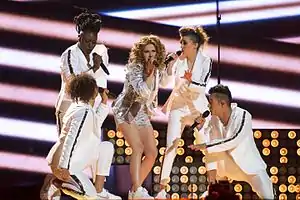 Laura Tesoro performing "What's the Pressure" in Stockholm (2016)
Laura Tesoro performing "What's the Pressure" in Stockholm (2016)._Photo_380.jpg.webp)

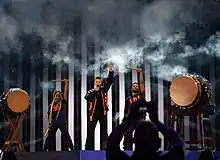

.jpg.webp)
.jpg.webp)
See also
- Belgium in the Eurovision Choir of the Year – A competition organised by the EBU for non-professional choirs.
- Belgium in the Junior Eurovision Song Contest – Junior version of the Eurovision Song Contest.
- Belgium in the Eurovision Young Dancers – A competition organised by the EBU for younger dancers aged between 16 and 21.
- Belgium in the Eurovision Young Musicians – A competition organised by the EBU for musicians aged 18 years and younger.
Notes and references
Notes
- Since the 1990 contest, the minimum age for participation is 16, meaning that Kim shall remain the youngest winner unless the age limit is waivered.
- The 1956 contest had secret voting and, apart from the winner, no results were released.
- Contains lines in English, French and Spanish
- Contains words in Italian language
- Contains lines in English
- According to the then-Eurovision rules, the top ten non-Big Four countries from the previous year along with the Big Four automatically qualified for the Grand Final without having to compete in semi-finals. For example, if Germany and France placed inside the top ten, the 11th and 12th spots were advanced to next year's Grand Final along with all countries ranked in the top ten.
- Although the song is in English, the French title is repeated throughout the song.
- The 2020 contest was cancelled due to the COVID-19 pandemic.
- All conductors are of Belgian nationality unless otherwise noted.
- The contest was organized by RTBF, but the Belgian entry was from VRT, hence Walloon Jo Carlier serving as musical director (and conducting for Cyprus) while a Flemish conductor led the Belgian entry.
References
- "Eurovision 2010: complete televoting and jury results". wiwibloggs.com. 30 June 2010. Retrieved 23 March 2014.
- Tielens, Filip (15 May 2021). "Waarom Vlaanderen telkens slecht scoort op het Eurovisiesongfestival". De Standaard. Retrieved 16 May 2021.
- "Belgium". Eurovision.tv.
- "Eurovision 2024 : Mustii représentera la Belgique au Concours Eurovision en Suède". RTBF.be (in French). 30 August 2023.
- Bijuvignesh, Darshan (30 August 2023). "Belgium: Mustii's Eurovision 2024 Song to Be Revealed in February". Eurovoix. Retrieved 30 August 2023.
- "Belgian National Final 1998". Archived from the original on 22 October 2009. Retrieved 2009-04-04.
- "Belgian National Final 2005". Archived from the original on 22 October 2009. Retrieved 2009-04-04.
- NWS, VRT (18 March 2020). "Door coronacrisis kan ook Songfestival niet doorgaan in 2020, Hooverphonic reageert: "wereldgezondheid gaat voor"". vrtnws.be (in Dutch). Retrieved 23 March 2020.
- NWS, VRT (20 March 2020). "Hooverphonic neemt volgend jaar deel aan het Eurovisiesongfestival: "We hebben er nog altijd enorm veel zin in"". vrtnws.be (in Dutch). Retrieved 23 March 2020.
- "Wie gaat voor België naar het Eurovisiesongfestival?" [Who will go to the Eurovision Song Contest for Belgium?]. vrt.be (in Dutch). VRT. 8 November 2022. Retrieved 8 November 2022.
- Jiandani, Sanjay (16 August 2023). "Belgium: RTBF confirms participation at Eurovision 2024". ESCToday. Retrieved 16 August 2023.
- Adams, William Lee (9 July 2015). "Poll: Who was the worst dressed Barbara Dex Award winner?". Wiwibloggs. Retrieved 8 December 2019.
- Roxburgh, Gordon (2012). Songs for Europe: The United Kingdom at the Eurovision Song Contest. Vol. One: The 1950s and 1960s. Prestatyn: Telos Publishing. pp. 93–101. ISBN 978-1-84583-065-6.
- Roxburgh, Gordon (2014). Songs for Europe: The United Kingdom at the Eurovision Song Contest. Vol. Two: The 1970s. Prestatyn: Telos Publishing. pp. 142–168. ISBN 978-1-84583-093-9.
- Roxburgh, Gordon (2016). Songs for Europe: The United Kingdom at the Eurovision Song Contest. Vol. Three: The 1980s. Prestatyn: Telos Publishing. ISBN 978-1-84583-118-9.
- "De festival-herinneringen van Jan Theys". Story. 12 May 1987.
- Granger, Anthony (20 May 2018). "EBU Wants to See More Commentators Attend the Eurovision Song Contest". eurovoix.com. Retrieved 12 December 2019.
- "Peter Van de Veire: "Als ik een voetballer was, zou ik iedereen onderuit schoppen"". niewsblad.be (in Dutch). 3 March 2018. Retrieved 12 December 2019.
- Granger, Anthony (22 April 2018). "Belgium: Danira Boukhriss Terkessidis Revealed as Spokesperson". eurovoix.com. Retrieved 12 December 2019.
- "Tweede halve finale van het Songfestival verhuist naar Ketnet". hln.be (in Dutch). 26 April 2019. Retrieved 12 December 2019.
- Granger, Anthony (14 March 2019). "Belgium: Maureen Louys & Jean-Louis Lahaye Confirmed As Commentators For Tel Aviv". eurovoix.com. Retrieved 12 December 2019.
- "Eurovision 2019 Spokespersons – Who will announce the points?". eurovisionworld.com. 18 May 2019. Retrieved 12 December 2019.
- "TV-gids". één.be.
- "Beleef het Eurovisiesongfestival bij de VRT". communicatie.vrt.be (in Flemish). 7 May 2021. Retrieved 14 May 2021.
- "Eurovision 2021 : 3 soirées exceptionnelles à ne pas manquer sur la RTBF !". rtbf.be.
- "Jouw voorjaar bij Eén". Een.be (in Dutch). VRT. Archived from the original on 23 December 2021. Retrieved 5 January 2022.
- "Eurovision 2022 : Préparez-vous à voter pour votre candidat préféré !". RTBF (in French). Retrieved 7 April 2022.
- "Ontdek het voorjaar 2023 van Eén". communicatie.een.be (in Flemish). Retrieved 3 January 2023.
- "Bart Cannaerts maakt Belgische jurypunten bekend in finale Songfestival 2023". Songfestival.be (in Dutch). 11 May 2023. Retrieved 11 May 2023.